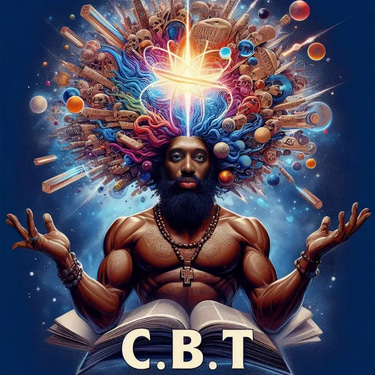From Reason to Revelation: Unveiling the Compelling Arguments for Belief in God
Contemplate the compelling arguments for belief in God, from ontological to moral perspectives. Despite criticisms, these frameworks resonate with those seeking meaning. Explore the dynamic interplay of reason and revelation, with personal experiences reinforcing belief. Uncover the deeply personal journey of self-discovery and find your own reasons for believing in God.
NATURAL T
James Cassel
1/17/20246 min read


INTRO TO THE ARGUMENTS FOR BELIEF IN GOD
Belief in God has been a topic of debate and contemplation for centuries. While some people find solace and meaning in their faith, others seek rational and logical explanations to support their belief. In this article, we will explore the various arguments for the existence of God, delving into the ontological, cosmological, teleological, moral, and modal ontological arguments. By examining these compelling arguments, we can gain a deeper understanding of the reasons behind the belief in God.
The ontological argument - Anselm's and Plantinga's perspectives
The ontological argument is a philosophical argument that aims to prove the existence of God through the concept of perfection. Anselm, a medieval theologian, proposed the first ontological argument, stating that God is the greatest being that can be conceived. He argued that if we can conceive of a being that is greater than anything else, then that being must exist in reality. Anselm's argument relies on the idea that existence is a necessary attribute of a perfect being.
Building upon Anselm's argument, Alvin Plantinga, a contemporary philosopher, introduced a modal version of the ontological argument. Plantinga argued that if it is possible for a maximally great being to exist, then it must exist in some possible world. He contended that if the concept of a maximally great being is logically coherent, then its existence is also logically possible. Plantinga's modal ontological argument provides a modern perspective on the ontological argument for belief in God.
The cosmological argument - Thomas Aquinas, Leibniz, and the Kalam cosmological argument
The cosmological argument seeks to establish the existence of God based on the explanation of the universe's existence. Thomas Aquinas, a prominent theologian, formulated the cosmological argument, also known as the Five Ways. Aquinas argued that everything in the universe is contingent and dependent on something else for its existence. He posited that this chain of causation must ultimately be grounded in a necessary being, which he identified as God.
Gottfried Leibniz, a German philosopher, further developed the cosmological argument by introducing the principle of sufficient reason. Leibniz argued that everything in the world has an explanation for its existence, and this explanation must ultimately be found in a necessary being. He contended that the existence of contingent beings requires the existence of a necessary being, which he identified as God.
The Kalam cosmological argument, derived from Islamic philosophy, asserts that the universe had a beginning and therefore requires a cause. This argument posits that everything that begins to exist must have a cause, and since the universe began to exist, it must also have a cause. Proponents of the Kalam cosmological argument argue that this cause must be transcendent and uncaused, which aligns with the concept of God.
The teleological argument - Paley's and the fine-tuning argument
The teleological argument, also known as the argument from design, posits that the intricate order and complexity of the universe imply the existence of an intelligent designer. William Paley, an English clergyman, put forth the teleological argument by using the analogy of a watch. He argued that just as a watch implies the existence of a watchmaker, the complexity and purposeful design of the universe imply the existence of a cosmic designer, namely God.
Another variant of the teleological argument is the fine-tuning argument. This argument contends that the precise values of the fundamental constants and physical laws of the universe are finely tuned to allow for the emergence of life. Proponents of the fine-tuning argument assert that the probability of such fine-tuning occurring by chance is astronomically low. They argue that the most plausible explanation for this fine-tuning is the existence of an intelligent creator who intentionally set the conditions for life.
The moral argument - Arguments against moral relativism
The moral argument for belief in God posits that objective moral values and duties exist, and their existence can only be adequately explained by the existence of God. This argument challenges moral relativism, which asserts that moral values and duties are subjective and vary from culture to culture or individual to individual.
Proponents of the moral argument contend that if moral values are truly objective, they must be grounded in a transcendent source. They argue that if God does not exist, there would be no objective basis for moral values and duties. Therefore, the existence of objective moral values and duties supports the belief in God as the ultimate source of morality.
The modal ontological argument - A contemporary perspective
The modal ontological argument presents a contemporary perspective on the ontological argument by using modal logic to demonstrate the necessary existence of God. This argument contends that if it is possible for God to exist, then God must exist in all possible worlds.
Proponents of the modal ontological argument argue that if we can conceive of a being that possesses all perfections, then it is possible for such a being to exist. They contend that if the concept of a maximally great being is coherent and logically consistent, then its existence is necessary in all possible worlds. This argument provides a powerful philosophical framework for understanding the existence of God.
Criticisms and counterarguments to the arguments for belief in God
While the arguments for belief in God are compelling, they also face criticisms and counterarguments from skeptics and atheists. Critics argue that the ontological argument relies on logical fallacies and linguistic confusion. They contend that the concept of a maximally great being is incoherent and that existence cannot be treated as a predicate.
Skeptics also challenge the cosmological argument by proposing alternative explanations for the existence of the universe, such as the multiverse hypothesis or the oscillating universe theory. They argue that the principle of sufficient reason does not necessarily point to the existence of a necessary being.
The teleological argument faces criticism from proponents of naturalistic explanations for the complexity and order in the universe. Skeptics propose that the appearance of design can be explained through natural processes such as evolution and self-organization.
Critics of the moral argument challenge the notion that objective moral values and duties require the existence of God. They argue that moral values can be grounded in human empathy, social contracts, or evolutionary survival strategies.
Exploring the relationship between reason and revelation
The arguments for belief in God provide a rational and logical framework for understanding the existence of a higher power. However, they do not encompass the entirety of religious belief. Many people also rely on personal experiences, spiritual encounters, and revelations to support their belief in God.
The relationship between reason and revelation is a complex and nuanced one. While reason can provide a foundation for belief in God, it is often complemented and enriched by personal experiences and encounters with the divine. These experiences can provide a deeper sense of connection and meaning, reinforcing one's belief in God.
The role of personal experience in belief in God
Personal experiences play a significant role in shaping one's belief in God. These experiences can range from profound moments of transcendence to subtle instances of guidance and comfort. For many individuals, these personal experiences serve as powerful evidence of the existence of God and reinforce their belief.
It is important to note that personal experiences are subjective and cannot be objectively proven or disproven. However, they hold immense significance for those who have undergone them. These experiences often serve as a catalyst for a deeper exploration of faith and provide a personal connection to the divine.
Conclusion - The cumulative case for belief in God
In conclusion, the arguments for belief in God present a compelling case for the existence of a higher power. From the ontological and cosmological arguments to the teleological and moral arguments, these philosophical and logical frameworks provide a rational basis for belief. The modal ontological argument offers a contemporary perspective, while personal experiences and revelations enrich one's understanding of God.
While these arguments face criticisms and counterarguments, they continue to resonate with individuals seeking meaning, purpose, and a deeper understanding of the universe. The relationship between reason and revelation is a dynamic one, with personal experiences playing a significant role in reinforcing belief.
Ultimately, belief in God is a deeply personal journey, influenced by a combination of reason, personal experiences, and spiritual encounters. By exploring the various arguments and considering the cumulative case, individuals can embark on a path of self-discovery and find their own reasons for believing in God.
CTA:
If you found this exploration of the arguments for belief in God intriguing, I invite you to further delve into this topic and engage in meaningful discussions. Whether you are a believer, a skeptic, or simply curious, exploring different perspectives and engaging in open dialogue can lead to personal growth and a deeper understanding of the complexities of faith.
